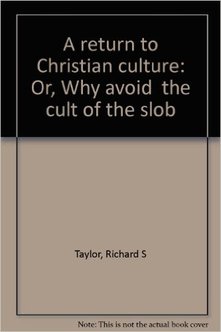 A Return to Christian Culture: or, Why Avoid “the Cult of the Slob” by Richard S. Taylor, originally published in 1973, now available in several formats through Amazon and other outlets. Most books I review are available at the public library , and that is always my first choice. I’ve just done some looking, though, and this one is not available through my library system or through its second-tier search capabilities. So I’d recommend your purchasing it, and, if you’d be so kind, to do so by clicking on the Amazon link above. You will then be taken to my “store” page and given the opportunity to purchase the book through my site. Those Amazon links are so-called “affiliate links,” and I get a small commission at no cost to you if you use them. You can get the Kindle edition for only $2.99 and a paperback for as little as around $2. The subtitle is different in some of the editions; I don’t know why they thought “a sagging society” was a better word picture than “cult of the slob.” I believe that this little book should be on every Christian’s bookshelf and be re-read periodically. What would Dr. Taylor think of American society now, ten years after his death? If he weren’t such a gentleman, his words would probably be, “I told you so!”
A Return to Christian Culture: or, Why Avoid “the Cult of the Slob” by Richard S. Taylor, originally published in 1973, now available in several formats through Amazon and other outlets. Most books I review are available at the public library , and that is always my first choice. I’ve just done some looking, though, and this one is not available through my library system or through its second-tier search capabilities. So I’d recommend your purchasing it, and, if you’d be so kind, to do so by clicking on the Amazon link above. You will then be taken to my “store” page and given the opportunity to purchase the book through my site. Those Amazon links are so-called “affiliate links,” and I get a small commission at no cost to you if you use them. You can get the Kindle edition for only $2.99 and a paperback for as little as around $2. The subtitle is different in some of the editions; I don’t know why they thought “a sagging society” was a better word picture than “cult of the slob.” I believe that this little book should be on every Christian’s bookshelf and be re-read periodically. What would Dr. Taylor think of American society now, ten years after his death? If he weren’t such a gentleman, his words would probably be, “I told you so!”
If I didn’t know the date of publication I’d think this book was written yesterday. In fact, the excesses in every area of life that he addresses are writ large today. I want to delve into three of them in some detail, hoping that you’ll want to read the whole book. And I will point out that, unlike some of the books I write about, this one is very short, less than 100 pages.
I’ll start with an idea sadly lacking in our increasingly divisive and divided society: tolerance and respect, indeed enjoyment, of people who are different from us. I’m going to quote at some length here and will then have to restrain myself from using very many of Taylor’s words in the other sections, as I don’t want to exceed my “fair use” limit:
It should not be supposed, however, that one’s enjoyment of this world must be confined to the beauties of nature and invention. The true Christian shares with God His love for men also. And in this love there is some degree of simple, unembarrassed liking for people as people. This wonder and excitement in people transcends their moral worthiness or spiritual condition. We should know how to enjoy people simply because all of us share in a common humanity. This does not imply indifference to the evil of men, or a complacency with people as they are. We will love them as God loves them, first as the created image of Himself, and second as the subject of His redemptive sufferings. This will make our love costly, and blend enjoyment with tears and delight with grief–sometimes anger. But too often we have had the anger for the sinner and reserved the enjoyment for the saint. In a sense this is natural and inevitable, for the saint is our spiritual kin while between us and the sinner is a gulf of spiritual alienation. We hesitate to bridge the gulf because the same gulf exists between him and God and we choose to be on God’s side. But in taking God’s side it is easy to call down fire from heaven on wicked men, and thus fail to be like God, who makes the sun shine and the rain fall on them all. (p. 65 of the 1975 paperback edition)
Isn’t that a great passage? Would that it were drilled into every heart. I am so weary of hearing one group bash another, especially during this election year, with seemingly no recognition that we are all human beings created by God, that we all have worth in His eyes, that only by showing love for each other can we ever, as Christians, win others to Christ.
Okay, second idea: that enjoyment of legitimate earthly pleasures can be a way to showcase our faith, that we aren’t glorifying God by going around in rags. The Bible does not teach austerity for its own sake. This idea resonates with me quite a bit, as I always feel a little torn about spending money on items that are just for show. After all, we don’t have to have curtains on the windows; we could just tape up garbage bags. We don’t have to have pictures on the walls or matching plates on the table. Taylor tells a story about Brother Andrew, the man who spent many years of his life smuggling Bibles into closed countries. He and his wife felt that they couldn’t spend any money on themselves and for years dressed themselves out of the so-called “missionary barrels.” Finally their eyes were opened by the words of a donor, who said, “God will send you what your family needs and what your work needs too. You are a mature Christian, Brother Andrew. Act like one.” Brother Andrew was indeed a mature Christian, so much so that he could accept this criticism: “Suddenly I saw that this was part of a whole pattern of poverty into which we had fallen, a dark, brooding, pinched attitude that hardly went with the Christ of the open heart that we were preaching to others.” (Taylor is quoting from the book God’s Smuggler here, another book I would highly recommend. This book and the Anne Ortlund one mentioned below are also linked to my affiliate page but are available at the library.) Obviously there is a balance; we aren’t called to be extravagant. But we don’t have to look like, as my mother used to say, “the ragpicker’s children.” (What is a ragpicker? I’m not sure.) There is a balance to be found, and we are called to more or less deprivation in our lives. Taylor mentions Charles Wesley, who felt drawn to a life of poverty but who was able to do so because he could be housed by prosperous Methodists.
Third idea: that good taste obeys certain principles and that we shouldn’t “settle for junk.” Taylor tells the story of how he and his wife bought an old house and carefully furnished and decorated it. They were not spending money unnecessarily and not trying to impress others but were instead, and I hope this isn’t too grandiose of a term, honoring the house’s “homeyness and dignity.” Taylor tells a funny story about having his devotions one morning and realizing during his prayer time that a chair needed to be moved to another area of the room. So he did a little rearranging, and when his wife came down and saw the change she said, “Of course! Why didn’t we see that before!” They were discovering what worked in their lovely old house. And I would say here that one of the nicest homes I’ve ever visited was furnished pretty much entirely from garage sales. It’s not a matter of money per se but of taste.
I will close with a quotation from another wonderful and short book, Disciplines of the Beautiful Woman by Anne Ortlund: “Look quality, think quality, talk quality.”


 I’m poaching from a podcast again today, this time from “
I’m poaching from a podcast again today, this time from “ Did you know that fear of public speaking is, at least according to some sources, the number one fear in America? I was reminded of this strange fact by
Did you know that fear of public speaking is, at least according to some sources, the number one fear in America? I was reminded of this strange fact by  So far I’ve mentioned two New Year’s Resolutions: my main one, phrased as the question “Why deny myself the pleasure?” about not letting small annoyances spoil my enjoyment, and my desire to read more books in the place of online articles. In pursuit of that second resolution I’ve gotten s little over a quarter of the way through
So far I’ve mentioned two New Year’s Resolutions: my main one, phrased as the question “Why deny myself the pleasure?” about not letting small annoyances spoil my enjoyment, and my desire to read more books in the place of online articles. In pursuit of that second resolution I’ve gotten s little over a quarter of the way through  If you follow this blog much you’ll know that I’m a great, great fan of the blogger, podcaster and author Gretchen Rubin. I was thinking today about how my own blogging and book writing was kicked off by the simple act of my reading a review of her first book on happiness,
If you follow this blog much you’ll know that I’m a great, great fan of the blogger, podcaster and author Gretchen Rubin. I was thinking today about how my own blogging and book writing was kicked off by the simple act of my reading a review of her first book on happiness, 
 I wrote last weekend about my “small, cushy adventure” at the Bible Study Fellowship area-wide conference at the Denver Convention Center. A great time of learning and blessing, And my position of being a group leader has also been a source of those same things. How did this all come about? From two very small choices. First of all, I wanted to join a daytime Bible study that fit in with my son’s then-schedule of taking the light rail to the Auraria campus for his classes. I did some online searches and found that there was a location just three miles from home with times that made it very doable for me to give him a ride.
I wrote last weekend about my “small, cushy adventure” at the Bible Study Fellowship area-wide conference at the Denver Convention Center. A great time of learning and blessing, And my position of being a group leader has also been a source of those same things. How did this all come about? From two very small choices. First of all, I wanted to join a daytime Bible study that fit in with my son’s then-schedule of taking the light rail to the Auraria campus for his classes. I did some online searches and found that there was a location just three miles from home with times that made it very doable for me to give him a ride. 
